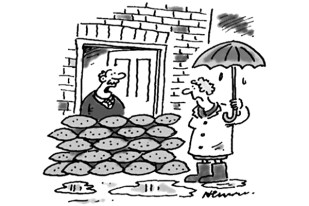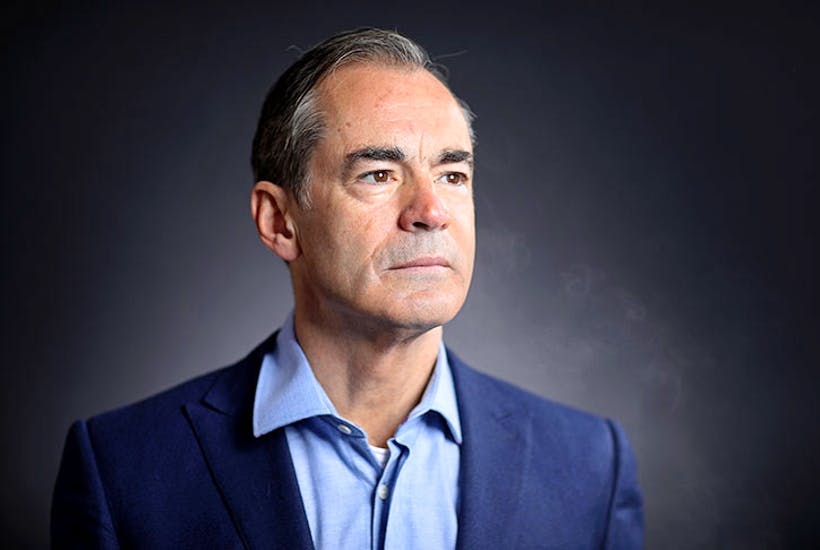I have enough self-awareness to know that the public are unlikely to care too much about a spat between a multi-millionaire ‘PR guru’ and what someone called a cabal of washed-up spin doctors. But I also know that millions and millions care about Brexit, and the fight for a Final Say referendum — which is why the spat matters.
The multi-millionaire ‘PR guru’ is Finsbury boss Roland Rudd, brother of the former cabinet minister Amber. The has-been spin doctors are me and Peter Mandelson, Tom Baldwin, who was a press adviser to Ed Miliband, and James McGrory, who did likewise for Nick Clegg.
If you have never heard of McGrory and Baldwin, you have almost certainly heard of the People’s Vote campaign, and as campaign director and communications director respectively, they deserve a lot of the credit for that. The People’s Vote has gone from a standing start to being central in the political debate in a couple of years. When we started out — I say ‘we’ because since the referendum I have devoted well over half my time to the anti-Brexit cause (unpaid, if you’re asking) — you could fit the MPs openly supporting us in the back of a cab. At the recent march in London we were turning MPs away, and we were within touching distance of a parliamentary majority when the election was called.
That march was one of many we have done, and two of them are among the three biggest marches of modern times. Again, the People’s Vote team headed by McGrory and Baldwin can take a lot of the credit for that. Not that they want it or ever asked for it. Unlike Rudd, they strike me as having understood the concept of teamship. (As summed up by a quote that has been on my desk since my time in Downing Street: ‘It is amazing what a small group can accomplish provided nobody cares who gets the credit’ — Harry S. Truman.)
From all the meetings I had to endure with Rudd, I most remember the time he said, pitifully: ‘But Tom only listens to you. He never listens to me!!!’ Rudd strikes me as being somewhat motivated by status, titles, by being thought to be important. I have never sensed that he has any great passion for stopping Brexit; have never heard him make what might be termed a strategic contribution. The lavish dinners he hosts appear to be as much about showing clients he can get big political figures to his table as about the campaign. Tony Blair and John Major have both been wheeled out in the hope their presence could help raise huge sums for the campaign. I was surprised to see the UK boss of Huawei at the one Rudd got me to go to; and that mixing of his business interests with the campaign left a nasty stench in my nostrils.

At the recent march, he was happy to glad-hand MPs and celebs backstage, despite having done nothing to help organise it. He gave himself the title ‘Chair of the People’s Vote campaign’, and gifted the title of deputy chair to his Oxford best buddy, Hugo Dixon.
His tin ear has become legendary. When we were seeking to rebut the charge that the campaign was run by a ‘metro-politan elite’, he booked himself onto the Today programme, where it was announced that ‘We’re now joined by the chairman of the People’s Vote campaign … live from Davos’. For a PR guy, he is not very good at it.
What he is good at is control through cronyism. While McGrory and Baldwin put in 14-hour days and seven-day weeks for the campaign over the summer, Rudd spent it trying to consolidate his hold on the Open Britain board. The People’s Vote campaign was a success despite its governance, never because of it.
Open Britain was one of five main groups that made up the People’s Vote. The others were the European Movement, the Joint Media Unit established by me, the writer Henry Porter and others, which raised more than £2 million in a fortnight, and two brilliant youth organisations, Our Future Our Choice, and FFS, For Our Future’s Sake. While those four campaigned, Rudd played games. Those games have helped virtually destroy a great campaign.
Though we did not want the election, it was obvious what our goal for it should be from the People’s Vote perspective — to build support for candidates likely to back a People’s Vote in the next parliament. The team spent weeks working on a tactical voting plan, which was to be unveiled as soon as the election was called. At which point Rudd launched a boardroom coup from his Finsbury HQ, sacking McGrory and Baldwin late on a Sunday night (unilaterally and without consulting the other groups), and ordering all staff to report for work under the interim CEO Patrick Heneghan the next morning.
At the march, he glad-handed MPs and celebs backstage, despite having done nothing to help organise it
A majority of Open Britain board members — most of whom had never set foot inside the campaign headquarters — backed Rudd without the faintest idea about the likely impact or the slightest due diligence being done.
I have no personal animus against Heneghan, but I could see he was being used in Rudd’s machinations. When complaints of harassment were made against Heneghan in the wake of his appointment to run the campaign, the three young women who had issued them were effectively accused of trying to smear Rudd’s appointee.
The staff, already angry, were now sickened and disgusted. They passed a motion of no confidence in Rudd and Heneghan by 40 to three. Among the three were Heneghan and Stuart Hand, whom Rudd would appoint as the second CEO in as many weeks — with almost no due diligence again — when, 11 days later, Heneghan was finally suspended.
By now, perhaps worried his diversity credentials were shredded, he was relying more on the board supporters Anne Weyman and Geeta Sidhu-Robb. In announcing Heneghan’s suspension, Weyman said he would be given full mental health support. When I asked her what mental health support the staff — and especially the young women — were being offered, since they had by now been locked out of their offices (Rudd simultaneously telling the media they could return to work any time), the response went from whataboutery to ‘stop being rude’ to, eventually, her telling me they were ‘in the process of finalising a contract’. In other words, they hadn’t thought of it until now. The psychological impact on the largely young staff has been enormous; Rudd and his cronies’ conduct a disgrace in which mental health campaigns will be taking an interest.
On Friday, Rudd announced he was ‘stepping down’, and would be replaced by Weyman. This was just the latest smoke-and-mirrors PR guff. He still has control of Open Britain through a fancy new shell organisation he created, Baybridge. All this was done in the middle of days of negotiations brokered by the European Movement, and in defiance of what the EM side thought had been agreed. After one act of bad faith too many, the negotiations collapsed.
So the bad news is that we were disabled for several weeks as an effective campaign at the most crucial time. But the good news? Now it is clear what an unpleasant, narcissistic and, frankly — when it comes to politics and campaigning — useless individual Roland Rudd is, the bulk of groups and campaigners genuinely devoted to the People’s Vote can get back to proper campaigning. He and his cronies can play their games to their hearts’ contents.
Yes, he has taken control of the data, and is seeking to do the same with funds raised from our grassroots supporters who are rightly sick and tired of this nonsense. But campaigns are about values and beliefs and principles, and those who have resisted him have plenty of those.
Rudd’s friends and enemies all say that he has long coveted a peerage, and failing that a knighthood. These things matter to some people. Perhaps if the Remain campaign had not been such a disaster, David Cameron would have obliged. Rudd may since have decided the Liberal Democrats were more likely to oblige. I was glad to hear from ‘-sources close to Jo Swinson’, as I believe they are called, that there was no chance of that.
But I think Rudd’s best hope may rest with Boris Johnson. After all Rudd has done more damage to the campaign than Johnson and Nigel Farage ever managed.
It’s interesting that Farage has hit the campaign trail with the line that a Tory-Brexit party alliance is essential to stop the country from having a second referendum. It is precisely why we need to form a Remain alliance. Despite Johnson’s, Farage’s and Roland Rudd’s best efforts, a second referendum remains a goal worth fighting for — and one that can be achieved.





Comments